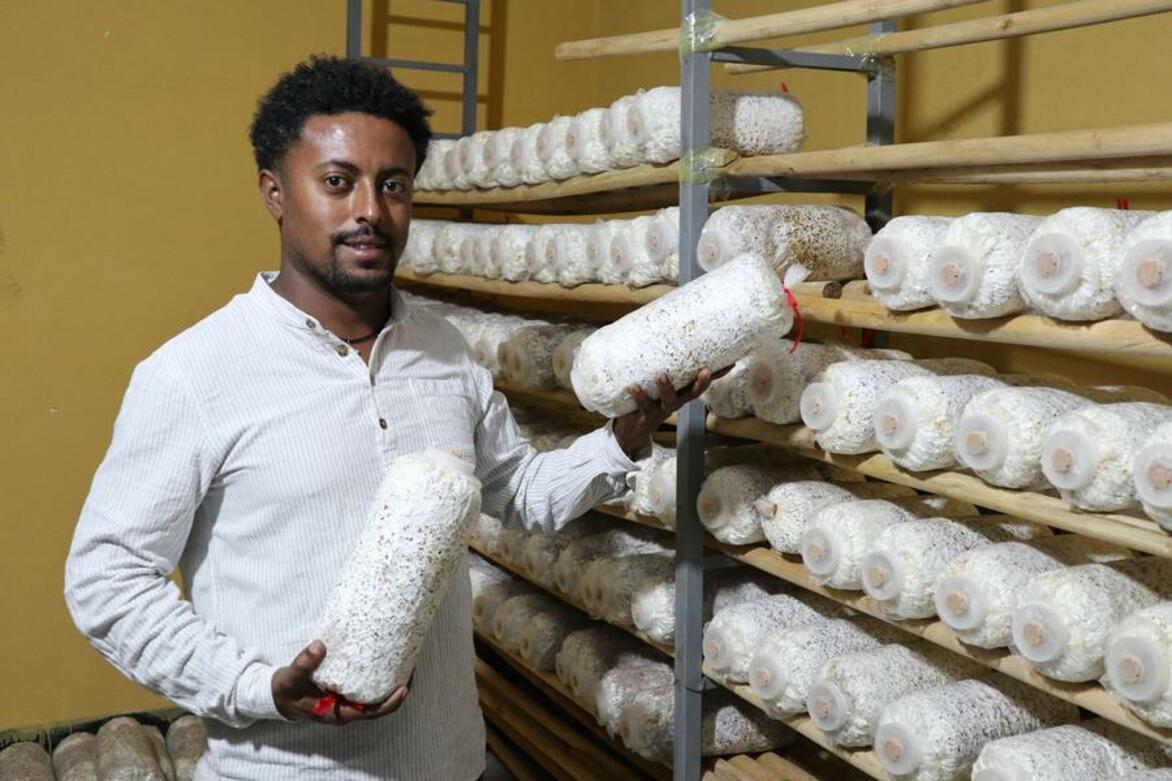(Hello Africa) How an Ethiopian entrepreneur turns fungus into fortune?
Xinhua
04 Jun 2025

In the highlands of Ethiopia, a local entrepreneur's fascination with mushrooms has sparked a surprising culinary movement, reshaping local diets and creating new economic opportunities.
ADDIS ABABA, June 4 (Xinhua) -- In the highlands of Ethiopia, a local entrepreneur's fascination with mushrooms has sparked a surprising culinary movement, reshaping local diets and creating new economic opportunities.
Mikias Tadesse, 29, recalled how his mushroom curiosity turned his life around, from a truck driver to a successful mushroom farmer, ultimately promoting a culinary change in Ethiopia.
Tadesse's curiosity began about three years ago upon his first encounter with a fleshy cluster of sprouted mushrooms in the backyard of a Chinese road construction camp in a remote village in southern Ethiopia.
"Intrigued by a sight foreign to my Ethiopian culinary experience and out of curiosity, I decided to try a mushroom dish prepared by the Chinese chefs. To my surprise, I really enjoyed the dish," said Tadesse.
Tadesse also found the vast potential of mushrooms to diversify Ethiopia's culinary landscape and bolster food security, thanks to their ease of cultivation and quick harvest cycle.
He then discussed the idea of starting mushroom cultivation with his Chinese colleagues. "Their response was immediate and very encouraging. They fully supported my business idea and promised to assist me in this new venture."
"From the very beginning, the Chinese agricultural experts have been the lifeline of my mushroom farm. They provided me with extensive technical knowledge through hands-on training and material support, including quality spawns that are necessary to navigate the delicate process of fungal cultivation," he said.
Tadesse's biggest challenge, however, was the public's unfamiliarity with mushrooms in Ethiopia. "I faced major market resistance because most people simply did not see mushrooms as food," he said.
"Even though I knew some restaurants and hotels in Addis Ababa served dishes with mushrooms, I had to visit nearly every supermarket and hotel to promote my products. Initially, I received countless rejections and skepticism," he recalled.
After many attempts, his persistence finally paid off. Despite the minimal demand from their customers, some supermarkets agreed to stock his mushrooms.
During the first six months, Tadesse often retrieved nearly half of the mushrooms from their shelves after three or four days. Gradually, he started to notice the growing demand for mushrooms as the orders from his partner supermarkets increased.
Buoyed by growing demand, he expanded his farm to four mushroom cultivation sheds, each spanning 250 square meters. Today, the young entrepreneur cultivates vibrant Yellow mushrooms, King Trumpets, and Oyster mushrooms.
"Though our farm produces an average of 50 kg of different varieties of mushrooms and has 12 dedicated workers, we are struggling to meet the growing demand," Tadesse said.
Although he has found success in mushroom cultivation, he remains deeply grateful to the Chinese experts. "Their support forms the foundation of our farm and business. From securing premium Chinese spawns to providing cutting-edge technical knowledge and tools, their assistance has been transformative."
Zheng Aibao, 59, who specializes in mushroom cultivation, is among the eight Chinese agricultural experts working in Ethiopia.
"This is my third time in Ethiopia. I am glad to see the mushroom cultivation method introduced by Chinese experts is taking root in five farms in the country," said Zheng.
As for Tadesse, his long-term goal is to deepen his knowledge of mushroom cultivation and start exporting processed mushrooms.
"I believe that with coordinated efforts from both government and private sectors, mushrooms will end up on more dinner tables across Ethiopia and really help add variety to what people eat," Tadesse said.
